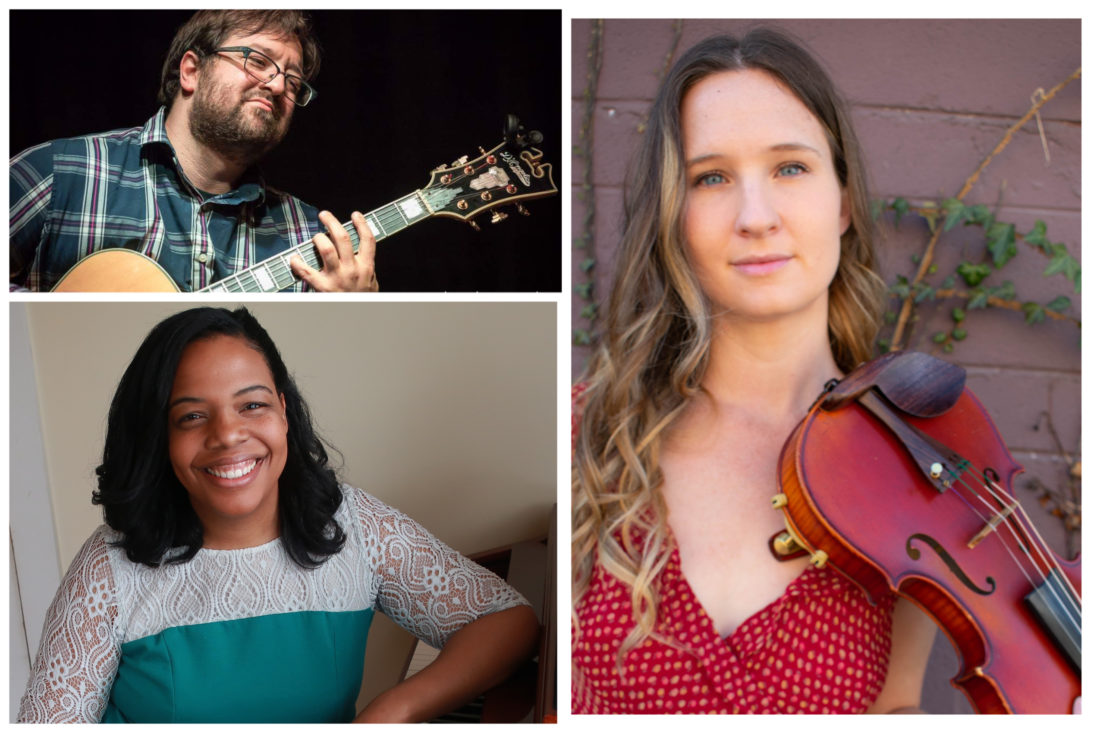Prior to mid-March, Kate Bryant spent most of each week traveling to teach music. In addition to providing instruction at Jim Beaver’s School of Music in Hendersonville on Mondays and Tuesdays, the Asheville-based violinist and pianist drove to students’ houses in West Asheville and Candler on Wednesdays, to Fairview on Thursdays and back to Candler on Sundays, all while finding time to host a few students at her home studio in the interim.
But with COVID-19 restrictions temporarily preventing her from physically being in the same room as her students, Bryant has turned to the videoconferencing platform Zoom to continue most of those lessons — and earn a living. Though she misses being able to play music with her students, Bryant has enjoyed being pushed to be more creative with her teaching, which she hopes makes her a better educator overall.
“You tend to get into your routine and your way of doing things, and then this gets thrown at you and you’re like, ‘Oh! This is different,’” Bryant says. “I hope my students are still excited and are paying attention through the camera — it’s really something us teachers should be thinking about all the time anyway.”
Among the new challenges Bryant has encountered with Zoom is the inability to hear simultaneous sound from teacher and student, requiring them to take turns. Even then, there’s a slight delay, an issue that’s magnified for students with poor internet connections. She also has to take into account camera angles and occasionally relies on parents of newer violin students to hold their children’s elbows to encourage proper technique — one of many hands-on details she was accustomed to providing herself.
“It’s not the same as being able to play music with someone in person. And especially for my younger students, it’s really helpful to be able to play their pieces along with someone because they don’t always know how to internalize that steady beat yet,” she says. “Sometimes with younger students, it’s a lot easier to just show them how to do something, like pointing on their piano to where their finger has to go.”
Asheville-based guitarist Dan Keller has managed to retain the bulk of his private students but lost three classes that he was teaching each week. In pivoting to Zoom, he’s been utilizing its “share screen” feature, which allows him to write on the student’s music, indicating important aspects, additions or changes.
“I’ve found this feature to make Zoom preferable to in-person lessons because I can screenshot and send edited music and also send variations on the original, so students have a variety of viewing options without me having to write a book on it,” he says.
While Keller appreciates the “necessary nudge to go digital,” which he feels has made him more organized and environmentally friendly, he misses certain perks of traditional teaching. For example, he often uses the eraser side of a pencil to point where students’ fingers should go on the guitar. Standing behind students allows him to see their thumb position. Being in the same room also allows him to pick up on such factors as “if they’re holding their breath unnecessarily or if they seem confused,” as well as generally getting a better sense of what they enjoy playing.
“All of those things are easier to gauge in person,” he says. “Fortunately, I’ve been teaching long enough that I can predict the gaps in comprehension. I wouldn’t want to be starting out and/or building a student body right now.”
Though guitars are fairly inexpensive in the realm of instruments, Kimberly Cann, a concert pianist and the director of Piano Lab Studios, notes that the high cost of owning a piano means that distance learning isn’t a one-size-fits-all solution. Prior to the pandemic, the overall Music Lab network, of which Piano Lab is a part, had around 250 students enrolled across studio locations in Asheville, Mills River and Fairview. Cann reports that “a hefty percentage” of those fledgling musicians are currently on hiatus from their studies.
“Some students have special needs and require in-person lessons to continue, while other students simply don’t have the financial means to continue without the instruments and equipment [that] our studio directly provides them,” Cann says. “Still others don’t have equitable access to the internet.”
For years, Piano Lab has offered online lessons as an occasional substitute for in-person lessons, primarily on snow days or other rare occasions when a student couldn’t make an appointment. But as a long-term fix, Cann urges students and her fellow teachers to be realistic about digital learning’s prospects.
“I don’t think anyone can pretend that Zoom or any other online platform will effectively replace the in-person experience of creating music together in a studio environment,” she says. “While it’s undeniably helpful to have these tools, this option simply doesn’t work for everyone.”
Bryant agrees, though once she’s able to be in the same room as her students, she wants to keep Zoom lessons as an option. She sees virtual gatherings as potentially useful in bringing together students spread across Buncombe County and overcoming logistical challenges that keep students from making the designated time in person.
“I think this will make everything a little more flexible for other life hiccups,” she says.




Before you comment
The comments section is here to provide a platform for civil dialogue on the issues we face together as a local community. Xpress is committed to offering this platform for all voices, but when the tone of the discussion gets nasty or strays off topic, we believe many people choose not to participate. Xpress editors are determined to moderate comments to ensure a constructive interchange is maintained. All comments judged not to be in keeping with the spirit of civil discourse will be removed and repeat violators will be banned. See here for our terms of service. Thank you for being part of this effort to promote respectful discussion.